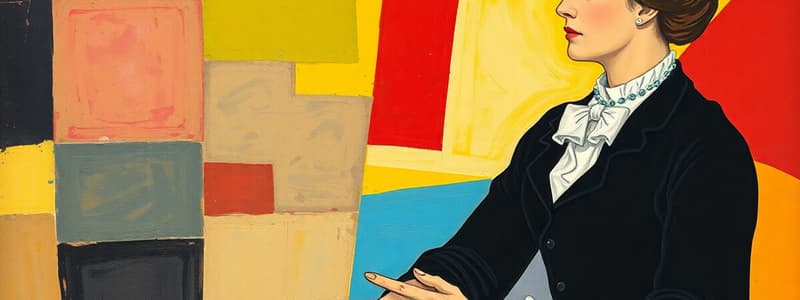Podcast
Questions and Answers
What impact did Isabella Beecher Hooker's advocacy have on women's suffrage at the national level?
What impact did Isabella Beecher Hooker's advocacy have on women's suffrage at the national level?
- She successfully lobbied for a constitutional amendment guaranteeing full suffrage for all women across the United States.
- She convinced several U.S. senators to support a limited national suffrage proposal. (correct)
- She spearheaded a national campaign that resulted in a Supreme Court decision mandating women's suffrage.
- Her efforts led to the immediate passage of federal legislation ensuring equal voting rights for women in all states.
How did Isabella Beecher Hooker primarily contribute to the improvement of married women's lives in Connecticut during the 19th century?
How did Isabella Beecher Hooker primarily contribute to the improvement of married women's lives in Connecticut during the 19th century?
- By establishing a network of women's shelters and support services throughout the state.
- By actively campaigning for and securing the right for married women to own property in Connecticut. (correct)
- By lobbying for legislation that granted married women equal rights to child custody in the event of separation.
- By founding a legal aid society specifically designed to represent married women in divorce cases.
In what way did Isabella Beecher Hooker's spiritual beliefs impact her relationships with her family members?
In what way did Isabella Beecher Hooker's spiritual beliefs impact her relationships with her family members?
- Her spiritual beliefs were completely detached from her family life, causing no noticeable impact on family dynamics or interactions.
- Her belief in Spiritualism worried some family members, leading to limitations in contact, though most reconciled with her before her death. (correct)
- Her commitment to Spiritualism was embraced by her siblings, Catherine and Henry, leading them to explore these beliefs together.
- Her unwavering belief in Spiritualism led to universal acceptance and admiration from all family members, strengthening their bonds.
What stance did Isabella Beecher Hooker take regarding the allegations against her brother, Henry, and how did it affect her family dynamics?
What stance did Isabella Beecher Hooker take regarding the allegations against her brother, Henry, and how did it affect her family dynamics?
How did Isabella Beecher Hooker continue her efforts in the women's suffrage movement after 1890?
How did Isabella Beecher Hooker continue her efforts in the women's suffrage movement after 1890?
What was the primary reason behind Lucy Stone's refusal to continue sewing clothes for male college students?
What was the primary reason behind Lucy Stone's refusal to continue sewing clothes for male college students?
How did Lucy Stone primarily finance her college education, demonstrating her independence and determination?
How did Lucy Stone primarily finance her college education, demonstrating her independence and determination?
What did Lucy Stone's experiences at Oberlin College reveal to her about the treatment of women in higher education?
What did Lucy Stone's experiences at Oberlin College reveal to her about the treatment of women in higher education?
Besides facing financial struggles, what other challenge did Lucy Stone encounter while at Oberlin College, hindering her pursuit of equality for women?
Besides facing financial struggles, what other challenge did Lucy Stone encounter while at Oberlin College, hindering her pursuit of equality for women?
What was the broader impact of Lucy Stone's actions and determination in the context of women's education?
What was the broader impact of Lucy Stone's actions and determination in the context of women's education?
Flashcards
Lucy Stone
Lucy Stone
A pioneering advocate for women's rights and education.
Opposition to sewing for college boys
Opposition to sewing for college boys
Lucy Stone refused to sew for male students, symbolizing her stand against gender inequality.
Oberlin College experience
Oberlin College experience
Lucy Stone faced gender inequality and financial disparity while studying at Oberlin College.
Advocate for antislavery
Advocate for antislavery
Signup and view all the flashcards
Financial disparity in work
Financial disparity in work
Signup and view all the flashcards
Isabella Beecher Hooker
Isabella Beecher Hooker
Signup and view all the flashcards
Property Rights for Married Women
Property Rights for Married Women
Signup and view all the flashcards
Family Conflicts
Family Conflicts
Signup and view all the flashcards
Limited National Suffrage Proposal
Limited National Suffrage Proposal
Signup and view all the flashcards
Spiritualism
Spiritualism
Signup and view all the flashcards
Study Notes
Lucy Stone
- Lucy Stone was part of a sewing circle making clothes for local boys.
- A pioneering educator named Mary Lyon visited the women and tried to interest them in starting a fund to send girls to college.
- Lucy refused to sew another seam of the shirt, or any other shirt, for a college boy when girls weren't allowed to attend.
- Lucy was stubborn, unafraid of her parents' opinions, and picked and sold berries and chestnuts.
- She left Massachusetts to attend college.
- She studied for the entrance exam and went to Oberlin College.
- Oberlin College only had mixed-gender tuition, and women were paid three cents an hour while male students earned up to ten cents a week.
Studying That Suits You
Use AI to generate personalized quizzes and flashcards to suit your learning preferences.




